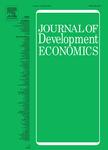-
作者:Torvik, R
作者单位:Norwegian University of Science & Technology (NTNU)
摘要:A new and very simple mechanism to explain why natural resource abundance may lower income and welfare is developed. In a model with rent seeking, a greater amount of natural resources increases the number of entrepreneurs engaged in rent seeking and reduces the number of entrepreneurs running productive firms. With a demand externality, it is shown that the drop in income as a result of this is higher than the increase in income from the natural resource. More natural resources thus lead to l...
-
作者:Campos, NF; Nugent, JB
作者单位:University of Southern California; University of Michigan System; University of Michigan; Centre for Economic Policy Research - UK; Newcastle University - UK
摘要:An unstable macroeconomic environment is often regarded as detrimental to economic growth. Among the sources contributing to such instability, much of the blame has been assigned to political issues. This paper empirically tests for a causal and negative long-run relation between political instability and economic growth but finds no evidence of such a relationship. Sensitivity analysis indicates that there is a contemporaneous negative relationship but also that, in the long run and ignoring ...
-
作者:Jafarey, S; Lahiri, S
作者单位:University of Essex; University of Liverpool
摘要:We examine the interaction between credit markets, trade sanctions and the incidence of child labour in a two-good, two-period model with unequally wealthy households. Both poverty and poor education quality, inter alia, are important determinants of child labour. The incidence of child labour decreases as we move from the case of borrowing constraints to the case in which poor households can borrow freely from rich ones and then to the case of perfect international credit markets. Trade sanct...
-
作者:Murata, Y
作者单位:Tokyo Metropolitan University
摘要:This paper presents a model of industrialization through rural-urban interdependence. It shows how an economy with a low cost share of industrial inputs in agricultural production and a low expenditure share of manufactured goods, together with a limited variety of industrial inputs, can be caught in a low development trap. By escaping from the trap the economy moves toward more roundabout methods of agricultural production, mass consumption of manufactured goods, and urbanization. The transit...
